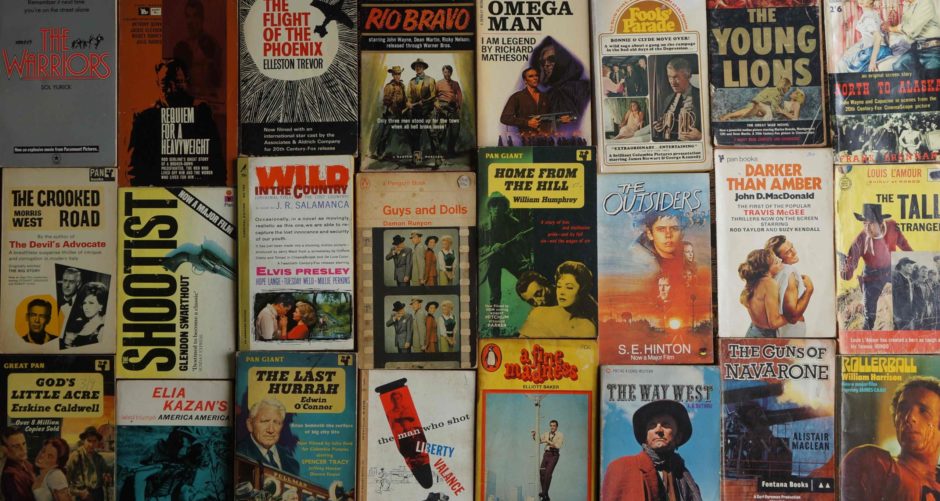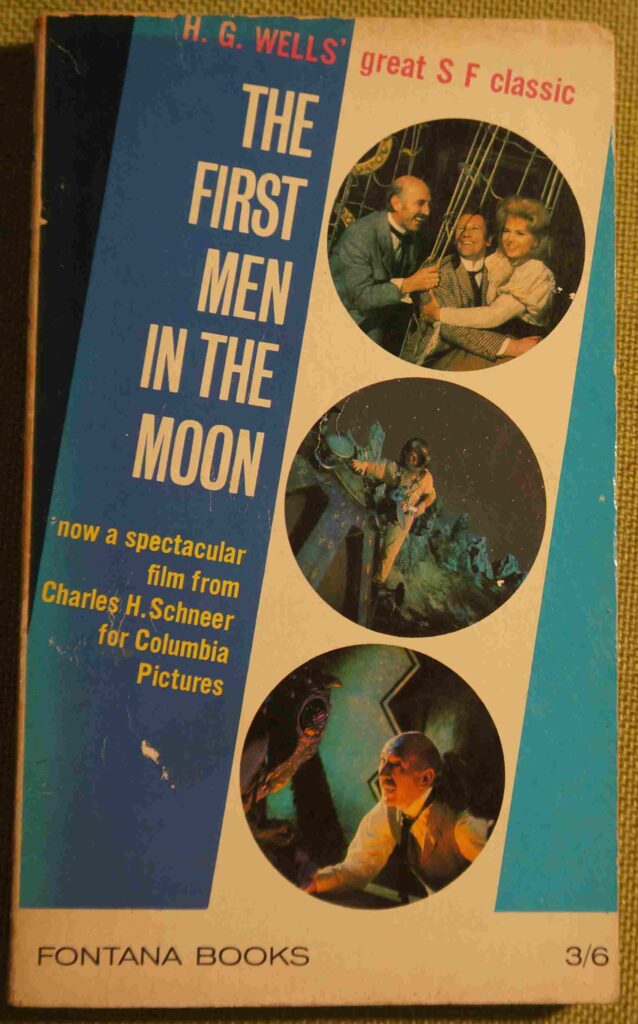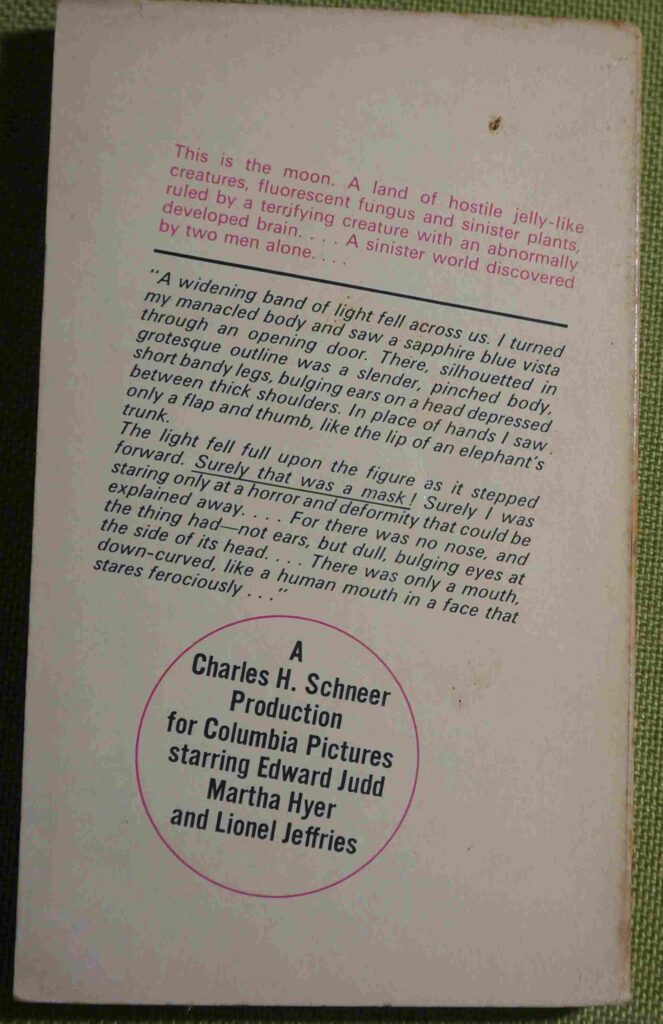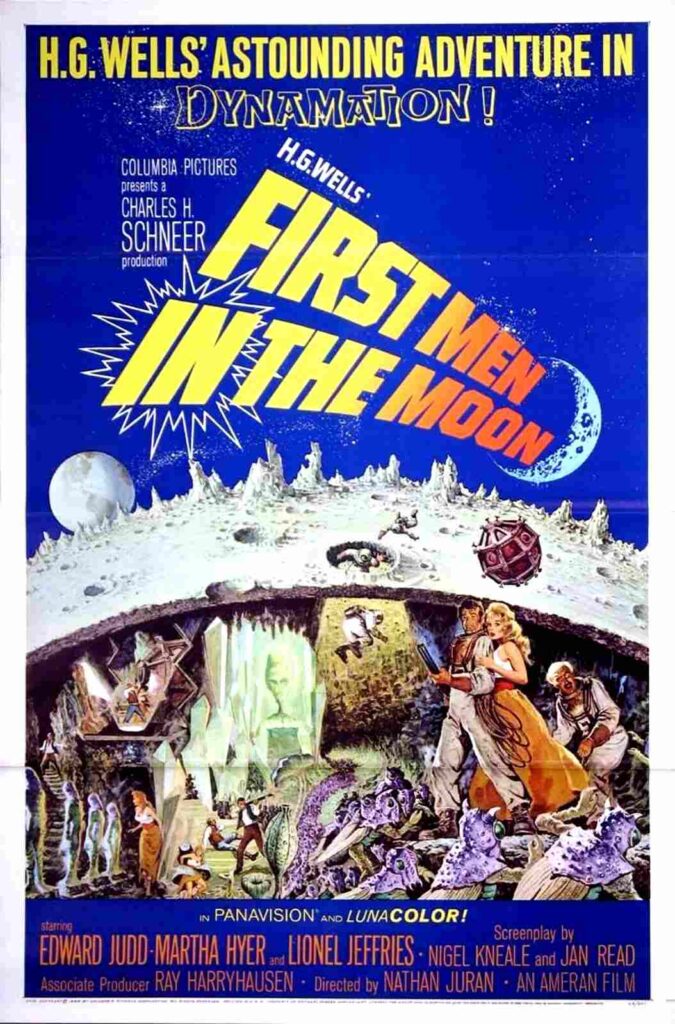THE FILM
FILM DIRECTOR: Nathan Juran
SCREENWRITER: Nigel Kneale
FILM STARS: Edward Judd, Martha Hyer, Lionel Jeffries, Miles Malleson, Norman Bird, Peter Finch (uncredited cameo)
COUNTRY: England
THIS BOOK
AUTHOR: H.G. Wells
TYPE: Novel
PUBLISHER: Fontana
THIS EDITION PUBLISHED: 1964
COUNTRY: Great Britain
COVER: Paperback
THE ORIGINAL BOOK
ORIGINAL AUTHOR: As Above
YEAR FIRST PUBLISHED: 1901
ORIGINAL BOOK TITLE: The film title
NOTES
GENRE: Sci Fi
WORDS: H.G. Wells adaptations are always a hoot, especially when they are set in their period trappings, which (admittedly) are rare.
His novels (and short stories) almost always make good films – The Invisible Man (the 1933 film with many spinoffs), War of the Worlds (1953, 2005 and many spinoffs), The Island of Dr. Moreau (1932 (called Island of Lost Souls) 1977 and 1996), The Time Machine (1960, 2002), and the schlocky entertaining The Food of the Gods (1965 (called Village of the Giants)) and 1976), Empire of the Ants (1977), as well as non-sci-fi – The History of Mr. Polly (1949), Kipps (1941), The Man Who Could Work Miracles (1937), The Passionate Friends (1949).
And he proves adaptable – the musical Half a Sixpence (1967) was based on his novel “Kipps” and rock opera (Jeff Wayne’s War of the Worlds (1979)) and radio (Orson Welles’ famous 1938 radio adaptation broadcast of The War of the Worlds) gave him a shot.
Wells, himself, is so well known he becomes a character in a spinoff of one his own adventures in Karl Alexander’s novel and Time after Time which was made into a (excellent) film in 1979, and where Wells uses his time machine to pursue Jack the Ripper into the 20th century.
Most of the films update his novels to contemporary times but like Jules Verne I like Wells best when he is done in period and The First Men in the Moon is (largely) set in Victorian times
Herbert George Wells (21 September 1866 – 13 August 1946) wrote more than fifty novels and dozens of short stories. His thought was scientific (his earliest specialised training was in biology) rather than fantasy and he thought in a Darwinian context. He was also an outspoken socialist, progressive, and often (but not always, as at the beginning of the First World War) sympathising with pacifist views. He wrote social commentary, politics, history, popular science, satire, biography, and autobiography but it’s his pre-World War 1 science fiction novels which led him to be called the “father of science fiction”.
“The First men in the Moon” is an entertaining read, and read today fuels anyone’s imagination (especially if you are of the steam punk bent). The protagonists (an English scientist and his neighbour) go to the moon and discover an underground empire with an insectoid population.
I saw the film before I read the novel. It is perhaps, the second Wells film I saw (War of the Worlds 1953 the first) when I saw it as a kid on TV in the 70s. It appealed to me then (I tracked down the book and read it shortly after), and I have watched it since a few times including once with my kids and it still holds up as an entertaining romp with some science and morality thrown in.
The film follows the book closely though with some notable differences. The increased knowledge of the moon in the 60s years since the novel’s publication required changes for 1964 audiences. The protagonists (still British though they are accompanied to the moon with a female romantic interest (a turn of the century “feminist freethinker” but the kind of woman Wells would have approved of) wear suits whilst on the surface (there was air in the novel), and the plant life that erupts across the lunar surface at sunrise has been done away with. Otherwise, the film has had to accommodate the moon race of the 60s and this is done effectively as a prequel, with the Americans landing on the moon and finding a British flag (now that’s funny) and a note leading to someone on Earth, and a story told in flashback.
As a kid the film was mildly frightening (human size ants! …come on that would scare the crap out of you as a kid) but all encompassing and as an adult it is a well-paced adventure with great special effects from Ray Harryhausen and directed by Nathan Juran (a expert in sci fi – The Deadly Mantis (1957), 20 Million Miles to Earth (1957), The Brain from Planet Arous (1957) and adventure The 7th Voyage of Sinbad (1958), Attack of the 50 Foot Woman (1958), Jack the Giant Killer (1962)). It didn’t hurt that he had worked as an art director before becoming a director. Written by Englishman Nigel Kneale (and expert in sci fi having done the Quatermass films and TV shows in the UK).
The film looks good. It may be an English film but clearly American money and input (American special effects master, director, and female lead) and produced by Columbia pictures, who made a lot of films in the UK in the 60s, give it gloss.
The screenplay contains quite a few confronting questions about human nature and colonialism as well as some light satire (all Wellsian), a nod to science (the moon creatures have solar power) and a unusual (though not unexpected) abrupt ending. There is also a melancholia as the old man looks back at his youthful adventure with his now deceased love which is endearing.
The cast (essentially three of them) are great: American female lead, spunky Martha Hyer, Lionel Jefferies as the manic eccentric inventor, a long way from the boring seriousness of modern movie scientists, and Edward Judd as the not invincible hero.
Not everything has to be Interstellar (2014), 2001: A Space Odyssey (1968) or Ad Astra (2019) … please, less of them. Of course, not everything has to be Guardians of the Galaxy (2014) or Star Wars (1977). There is a place where science and fiction, fact and fun, can intersect, but so rarely do, but it does here. Importantly, there are enough pauses in the action for the wonder of the adventure to sink in and make an impact on the imagination.
You have to watch this and unless you are an overly serious and pretentious type, or like your action with no pauses, you will enjoy this film.
NB: it was remade in 2010 as Made for TV movie in England. I have not seen that.
LINKS
TRAILER
POSTER




The war of the worlds deserves a good film version true to the novel. The theme of the book- the evil of European imperialism- is more forcefully made in the context of an invasion of southern England in 1900 than New Jersey in 2005.
Are you planning on doing the Time Machine with Rod Taylor? I think it was first leading role in a A level movie.
Again, I half recall seeing a 196o’s English comedy with Norman Wisdom playing some ordinary guy who accidentally ended up as an astronaut in the British space program ( I am not making this up) whose rocket lands in the Australian outback. Norman thinks he has landed on the moon, the look on his face when he sees an empty beer bottle is priceless. I suspect the writer was having a crack at FMITM.
I don’t mind any of the versions of The war of the worlds “. The 1978 Jeff Wayne was reasonably faithful to the book, despite the music. I like the Spielberg film because it’s an adventure but I love the 1953 version because I saw it as a kid and it has the 50s cold war paranoia as well. I think the tie-in I have is for the 1978 musical.
Time Machine – I will do if I find the tie in. Love the film, love Rod, love the book.
Norman Wisdom! He was on every Saturday back in the 70s. All the comedians had to go to space – Bob Hope (albeit briefly at the end of Road to Hong Kong), The Three Stooges (The Three Stooges in Orbit), Jerry Lewis (Way…Way Out and Visit to a small Planet (as the alien), Don Knotts (The reluctant Astronaut), Abbott and Costello (Abbott and Costello Go to Mars), Mel Brooks (Spaceballs), Benny Hill (well via Fred Scuttle trying to funs a British space program). The Wisdom film was “The Bulldog Breed” …not sure if it
Incidentally, whilst looking at “Bulldog Breed” I came across this …on Wikipedia. Sometimes truth is stranger than fiction?
“Wisdom became a cultural icon in Albania, where he was one of the few Western actors whose films were allowed in the country under Enver Hoxha. According to Hoxha’s dialectical materialist viewpoint, proletarian Norman’s ultimately victorious struggles against capitalism, personified by Mr Grimsdale and the effete aristocratic characters played by Jerry Desmonde, were a Communist parable on the class war. He was known as Mr Pitkin after the character from his films. In 1995, he visited the post-Stalinist country where, to his surprise, he was greeted by many appreciative fans, including the then President, Sali Berisha”.